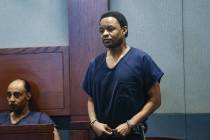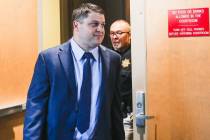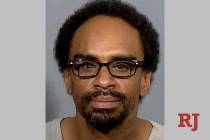Committee OKs $1.5 million settlement for wrongly imprisoned man
The Metropolitan Police Department will shell out the largest settlement in its history -- $1.5 million -- to a man who was wrongly imprisoned because of a crime lab DNA mix-up.
"We took four years of his life away, and there's no giving that back," Sheriff Doug Gillespie said Monday after the Police Department's fiscal affairs committee approved the payment to Dwayne L. Jackson.
The 28-year-old served nearly three years in prison and another six months on parole after pleading guilty to a 2001 robbery and kidnapping after DNA test results linked him to the crime.
The Police Department didn't find out about a potential problem until October, when California authorities matched DNA from the Las Vegas case to Howard Dupree Grissom, who had been convicted of a brutal rape and stabbing.
Grissom is Jackson's cousin and had been a suspect in the Las Vegas crime.
Both men had given DNA samples during the investigation, and when veteran lab technician Terry Cook mixed up the samples, he erroneously linked Jackson to the crime Grissom had committed.
Grissom went on to serve prison time for a 2007 robbery and is serving a 41-years-to-life prison sentence in California after being convicted in the rape and stabbing case.
Gillespie revealed the error earlier this month in a news conference.
Jackson's lawyer, David Chesnoff, said his client was pleased with how quickly the settlement was reached and approved. Jackson declined to be interviewed.
The $1.5 million breaks down to $56 for every hour Jackson spent behind bars during his 1,112 days in jail or prison.
The payment will come from the Police Department's self-insurance fund, which has a balance of about $12 million. The agency puts money into the fund each year through the annual budget.
Las Vegas City Councilman Steve Wolfson, one of five fiscal affairs committee members, commended the Police Department's response to the mistake and approved the payment to Jackson.
"I don't think it was intentional. He made a mistake," the veteran defense lawyer said of the lab worker.
Since discovering the mix-up, the agency has begun reviewing more than 200 of Cook's cases. He stopped handling DNA in 2004, when he was transferred to another part of the lab.
The agency will retest DNA in those cases in which it can find testable evidence, and it has begun reviewing its policies and procedures in DNA handling.
Gillespie said much has already changed in a decade since the mix-up.
"The way we did things in 2001 are significantly different than what we do today in 2011," he said.
The crime lab has undergone two inspections for accreditation and another three audits to meet FBI qualifications, Criminalistics Bureau Executive Director Linda Krueger told the board.
With the internal review, Gillespie will have an independent auditor review the lab's operations, he said.
"It's very difficult to say never, but we will do everything in our power to make sure this does not happen again," Gillespie said.
Contact reporter Brian Haynes at bhaynes@reviewjournal.com or 702-383-0281.























